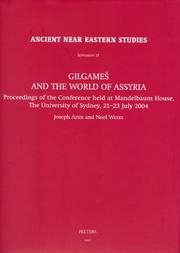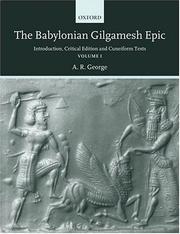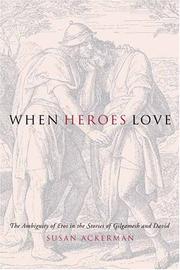| Listing 1 - 10 of 10 |
Sort by
|
Book
ISBN: 3769615719 9783769615715 Year: 1993 Volume: 1993/4 Publisher: München : Bayerische Akademie der Wissenschaften,
Abstract | Keywords | Export | Availability | Bookmark
 Loading...
Loading...Choose an application
- Reference Manager
- EndNote
- RefWorks (Direct export to RefWorks)
Gilgamesh --- Epic of Gilgamesh --- Ghilgameš --- Gilgamesch --- Gilgamesz --- Gilgāmish --- Guilgamesh --- Ishtar and Izdubar --- Ishtar (Assyro-Babylonian epic) --- Izdubar --- Jiljāmish --- Kilkāmish --- Sha naqba imura --- Criticism, Textual. --- Translations into German. --- Criticism, Textual --- Translations into German --- Litterature sumerienne

ISBN: 9789042918023 9042918020 Year: 2007 Volume: 21 Publisher: Leuven, Belgium ; Paris ; Dudley, Mass : Peeters,
Abstract | Keywords | Export | Availability | Bookmark
 Loading...
Loading...Choose an application
- Reference Manager
- EndNote
- RefWorks (Direct export to RefWorks)
Gilgamesh --- Assyria --- Assyrie --- Congresses. --- Congrès --- 222.2 --- 299.219 --- Genesis --- Godsdiensten van Babyloniërs en Assyriërs --- Conferences - Meetings --- 299.219 Godsdiensten van Babyloniërs en Assyriërs --- Congrès --- Epic of Gilgamesh --- Ghilgameš --- Gilgamesch --- Gilgamesz --- Gilgāmish --- Guilgamesh --- Ishtar and Izdubar --- Ishtar (Assyro-Babylonian epic) --- Izdubar --- Jiljāmish --- Kilkāmish --- Sha naqba imura --- Assur (Kingdom) --- Asshur (Kingdom) --- Congresses
Book
ISBN: 9789004178489 9004178481 9786612950674 9047440838 1282950673 9789047440833 9781282950672 6612950676 Year: 2010 Volume: 39 Publisher: Leiden Boston Brill
Abstract | Keywords | Export | Availability | Bookmark
 Loading...
Loading...Choose an application
- Reference Manager
- EndNote
- RefWorks (Direct export to RefWorks)
The Akkadian Gilgamesh Epic, perhaps the most famous of Mesopotamian literature, has been considered the artistry of one author inspired by Sumerian tales. Specialists have assumed that all the earliest evidence (ca. 1800-1700 BCE) reflects this creative unity. Deep contrasts in characterization and narrative logic, however, distinguish the central adventure to defeat the monster Huwawa from what precedes and follows it. The Huwawa narrative stands on its own, so that the epic must have been composed from this prior Akkadian composition. Recognition of the tale embedded in the epic allows each block of material to be understood on its own terms. Such literary-historical investigation from contemporary texts is new to Assyriology and may produce important results when applied to other Mesopotamian writing. 'The book is well written and tightly argued...This makes it a first point of reference for anyone interested in the OB evidence for the Gilgamesh Epic.' Scott C. Jones, Covenant College
Assyriology --- Epic poetry, Assyro-Babylonian --- History. --- History and criticism. --- Gilgamesh. --- History and criticism --- History --- Gilgamesh --- Assyro-Babylonian epic poetry --- Assyro-Babylonian poetry --- Assyro-Babylonian studies --- Epic of Gilgamesh --- Ghilgameš --- Gilgamesch --- Gilgamesz --- Gilgāmish --- Guilgamesh --- Ishtar and Izdubar --- Ishtar (Assyro-Babylonian epic) --- Izdubar --- Jiljāmish --- Kilkāmish --- Sha naqba imura
Book
ISBN: 9780521509794 9781139048736 0521509793 1108749925 1316399052 1316396851 1139048732 1316399591 1316400131 1316398471 1316393615 1108994105 Year: 2016 Publisher: Cambridge Cambridge University Press
Abstract | Keywords | Export | Availability | Bookmark
 Loading...
Loading...Choose an application
- Reference Manager
- EndNote
- RefWorks (Direct export to RefWorks)
This book provides a groundbreaking reassessment of the prehistory of Homeric epic. It argues that in the Early Iron Age bilingual poets transmitted to the Greeks a set of narrative traditions closely related to the one found at Bronze-Age Hattusa, the Hittite capital. Key drivers for Near Eastern influence on the developing Homeric tradition were the shared practices of supralocal festivals and venerating divinized ancestors, and a shared interest in creating narratives about a legendary past using a few specific storylines: theogonies, genealogies connecting local polities, long-distance travel, destruction of a famous city because it refuses to release captives, and trying to overcome death when confronted with the loss of a dear companion. Professor Bachvarova concludes by providing a fresh explanation of the origins and significance of the Greco-Anatolian legend of Troy, thereby offering a new solution to the long-debated question of the historicity of the Trojan War.
Epic poetry, Greek --- Hittites --- Hittite literature --- History and criticism --- Religion --- Homer. --- Gilgamesh --- Homer --- Epic poetry, Greek - History and criticism --- Hittites - Religion --- Hittite literature - History and criticism --- Homer - Iliad --- History and criticism. --- Religion. --- Gilgamesh. --- Epic of Gilgamesh --- Ghilgameš --- Gilgamesch --- Gilgamesz --- Gilgāmish --- Guilgamesh --- Ishtar and Izdubar --- Ishtar (Assyro-Babylonian epic) --- Izdubar --- Jiljāmish --- Kilkāmish --- Sha naqba imura
Book
ISBN: 0801463424 0801463416 9780801463419 0801450357 9780801450358 1322505675 Year: 2011 Publisher: Ithaca, NY
Abstract | Keywords | Export | Availability | Bookmark
 Loading...
Loading...Choose an application
- Reference Manager
- EndNote
- RefWorks (Direct export to RefWorks)
The world's oldest work of literature, the Epic of Gilgamesh recounts the adventures of the semimythical Sumerian king of Uruk and his ultimately futile quest for immortality after the death of his friend and companion, Enkidu, a wildman sent by the gods. Gilgamesh was deified by the Sumerians around 2500 BCE, and his tale as we know it today was codified in cuneiform tablets around 1750 BCE and continued to influence ancient cultures-whether in specific incidents like a world-consuming flood or in its quest structure-into Roman times. The epic was, however, largely forgotten, until the cuneiform tablets were rediscovered in 1872 in the British Museum's collection of recently unearthed Mesopotamian artifacts. In the decades that followed its translation into modern languages, the Epic of Gilgamesh has become a point of reference throughout Western culture.In Gilgamesh among Us, Theodore Ziolkowski explores the surprising legacy of the poem and its hero, as well as the epic's continuing influence in modern letters and arts. This influence extends from Carl Gustav Jung and Rainer Maria Rilke's early embrace of the epic's significance-"Gilgamesh is tremendous!" Rilke wrote to his publisher's wife after reading it-to its appropriation since World War II in contexts as disparate as operas and paintings, the poetry of Charles Olson and Louis Zukofsky, novels by John Gardner and Philip Roth, and episodes of Star Trek: The Next Generation and Xena: Warrior Princess.Ziolkowski sees fascination with Gilgamesh as a reflection of eternal spiritual values-love, friendship, courage, and the fear and acceptance of death. Noted writers, musicians, and artists from Sweden to Spain, from the United States to Australia, have adapted the story in ways that meet the social and artistic trends of the times. The spirit of this capacious hero has absorbed the losses felt in the immediate postwar period and been infused with the excitement and optimism of movements for gay rights, feminism, and environmental consciousness. Gilgamesh is at once a seismograph of shifts in Western history and culture and a testament to the verities and values of the ancient epic.
Assyro-Babylonian literature. --- Ancient History & Classical Studies. --- LITERARY CRITICISM / Ancient & Classical. --- Akkadian literature --- Babylonian literature --- Gilgamesh --- Gilgamesh. --- Epic of Gilgamesh --- Ghilgameš --- Gilgamesch --- Gilgamesz --- Gilgāmish --- Guilgamesh --- Ishtar and Izdubar --- Ishtar (Assyro-Babylonian epic) --- Izdubar --- Jiljāmish --- Kilkāmish --- Sha naqba imura --- Influence. --- Adaptations.
Book
ISBN: 9783727816864 3525543662 3727816864 9783525543665 Year: 2010 Volume: 245 Publisher: Fribourg Academic Press
Abstract | Keywords | Export | Availability | Bookmark
 Loading...
Loading...Choose an application
- Reference Manager
- EndNote
- RefWorks (Direct export to RefWorks)
"This collection of articles has two aims: The first is to create a comprehensive compendium of iconography on Gilgamesh, that includes three formerly published and several new papers on the visual representation of Gilgamesh. The second is to publish some objects of Near Eastern art from the Bible+Orient Collection in Fribourg, which relate to Gilgamesh."--Summary.
Gilgamesh (Legendary character) --- Art, Assyro-Babylonian. --- Art. --- Gilgamesh --- Criticism, interpretation, etc. --- Art, Assyro-Babylonian --- 892.1 --- 73.046 --- 82:7 --- 82:7 Literatuur en kunst --- Literatuur en kunst --- 73.046 Mythologie; religie; epiek in de beeldhouwkunst --- Mythologie; religie; epiek in de beeldhouwkunst --- 892.1 Akkadische, Sumerische literatuur --- Akkadische, Sumerische literatuur --- Art, Babylonian --- Assyro-Babylonian art --- Babylonian art --- Epic of Gilgamesh --- Ghilgameš --- Gilgamesch --- Gilgamesz --- Gilgāmish --- Guilgamesh --- Ishtar and Izdubar --- Ishtar (Assyro-Babylonian epic) --- Izdubar --- Jiljāmish --- Kilkāmish --- Sha naqba imura
Book
ISBN: 1781706468 1526102374 9781781706466 9781526102379 9780719090516 0719090512 9781526102386 1526102382 Year: 2015 Publisher: Manchester
Abstract | Keywords | Export | Availability | Bookmark
 Loading...
Loading...Choose an application
- Reference Manager
- EndNote
- RefWorks (Direct export to RefWorks)
Details the discovery of The epic of Gilgamesh, and explores the broader tensions concerning history and time that it highlighted in Victorian culture
Epic poetry, Assyro-Babylonian --- Assyro-Babylonian epic poetry --- Assyro-Babylonian poetry --- History and criticism. --- Smith, George, --- Gilgamesh. --- Epic of Gilgamesh --- Ghilgameš --- Gilgamesch --- Gilgamesz --- Gilgāmish --- Guilgamesh --- Ishtar and Izdubar --- Ishtar (Assyro-Babylonian epic) --- Izdubar --- Jiljāmish --- Kilkāmish --- Sha naqba imura --- Literature and society --- Literature --- Social & Cultural History --- HISTORY / Social History --- Literary studies: c 1800 to c 1900 --- History --- Assyro-Babylonian literature --- George Smith. --- Victorian geology. --- narrative. --- sublime. --- time.
Book
ISBN: 9789054878599 Year: 2011 Publisher: Brussel Academic and Scientific Publishers
Abstract | Keywords | Export | Availability | Bookmark
 Loading...
Loading...Choose an application
- Reference Manager
- EndNote
- RefWorks (Direct export to RefWorks)
Comparative religion --- Philosophy and psychology of culture --- Bereavement in literature --- Death in literature --- Dood in de literatuur --- Eschatologie --- Eschatology --- Fins dernières --- Greek mythology --- Griekse mythologie --- Last things (Theology) --- Middle Eastern mythology --- Mort dans la littérature --- Mythologie [Griekse ] --- Mythologie [Midden-Oosten ] --- Mythologie grecque --- Mythologie moyen-orient --- Mythology [Greek ] --- Mythology [Middle Eastern ] --- Oriental mythology --- Sterfte in de literatuur --- Uitersten (Theologie) --- Death --- Mythology --- Gilgamesh --- Religious thought --- Theology, Doctrinal --- Intermediate state --- Religious aspects --- Gilgamesh. --- Epic of Gilgamesh --- Ghilgameš --- Gilgamesch --- Gilgamesz --- Gilgāmish --- Guilgamesh --- Ishtar and Izdubar --- Ishtar (Assyro-Babylonian epic) --- Izdubar --- Jiljāmish --- Kilkāmish --- Sha naqba imura

ISBN: 0198149220 9780198149224 0199278415 9780199278411 9780199278428 0199278423 Year: 2003 Publisher: Oxford : Oxford University Press,
Abstract | Keywords | Export | Availability | Bookmark
 Loading...
Loading...Choose an application
- Reference Manager
- EndNote
- RefWorks (Direct export to RefWorks)
Epic poetry, Assyro-Babylonian --- Poésie épique assyro-babylonienne --- History and criticism. --- Histoire et critique --- Gilgamesh. --- History and criticism --- Gilgamesh --- 892.11 --- -Assyro-Babylonian epic poetry --- Assyro-Babylonian poetry --- Babylonische literatuur --- -Babylonische literatuur --- 892.11 Babylonische literatuur --- -892.11 Babylonische literatuur --- Assyro-Babylonian epic poetry --- Poésie épique assyro-babylonienne --- Epic of Gilgamesh --- Ghilgameš --- Gilgamesch --- Gilgamesz --- Gilgāmish --- Guilgamesh --- Ishtar and Izdubar --- Ishtar (Assyro-Babylonian epic) --- Izdubar --- Jiljāmish --- Kilkāmish --- Sha naqba imura --- Epic poetry [Assyro-Babylonian ] --- Epic poetry, Assyro-Babylonian - History and criticism

ISBN: 0231132603 9780231132602 0231507259 Year: 2005 Volume: *2 Publisher: New York : Columbia University Press,
Abstract | Keywords | Export | Availability | Bookmark
 Loading...
Loading...Choose an application
- Reference Manager
- EndNote
- RefWorks (Direct export to RefWorks)
Toward the end of the Mesopotamian Epic of Gilgamesh King Gilgamesh laments the untimely death of his comrade Enkidu, "my friend whom I loved dearly." Similarly in the Bible, David mourns his companion, Jonathan, whose "love to me was wonderful, greater than the love of women." These passages, along with other ambiguous erotic and sexual language found in the Gilgamesh epic and the biblical David story, have become the object of numerous and competing scholarly inquiries into the sexual nature of the heroes' relationships. Susan Ackerman's innovative work carefully examines the stories' sexual and homoerotic language and suggests that its ambiguity provides new ways of understanding ideas of gender and sexuality in the ancient Near East and its literature. In exploring the stories of Gilgamesh and Enkidu and David and Jonathan, Ackerman cautions against applying modern conceptions of homosexuality to these relationships. Drawing on historical and literary criticism, Ackerman's close readings analyze the stories of David and Gilgamesh in light of contemporary definitions of sexual relationships and gender roles. She argues that these male relationships cannot be taken as same-sex partnerships in the modern sense, but reflect the ancient understanding of gender roles, whether in same- or opposite-sex relationships, as defined as either active (male) or passive (female). Her interpretation also considers the heroes' erotic and sexual interactions with members of the opposite sex. Ackerman shows that the texts' language and erotic imagery suggest more than just an intense male bonding. She argues that, though ambiguous, the erotic imagery and language have a critical function in the texts and serve the political, religious, and aesthetic aims of the narrators. More precisely, the erotic language in the story of David seeks to feminize Jonathan and thus invalidate his claim to Israel's throne in favor of David. In the case of Gilgamesh and Enkidu, whose egalitarian relationship is paradoxically described using the hierarchically dependent language of sexual relationships, the ambiguous erotic language reinforces their status as liminal figures and heroes in the epic tradition.
Homoseksualiteit in de Bijbel --- Homoseksualiteit in de literatuur --- Homosexuality in literature --- Homosexuality in the Bible --- Homosexualité dans la Bible --- Homosexualité dans la littérature --- Homosexuality in literature. --- Homosexuality in the Bible. --- 222.6 --- Samuelboeken. Boeken der koningen. David. Salomon. Elia. Elisa. Josias --- David, --- Jonathan --- Jonathan, --- Jonathas --- יהונתן --- Daud, --- Dāwūd, --- Nabī Dāwūd, --- דוד --- דוד, --- דוד המלך --- Gilgamesh. --- Bible. --- Samuel (Book of the Old Testament) --- Shemuʼel (Book of the Old Testament) --- Epic of Gilgamesh --- Ghilgameš --- Gilgamesch --- Gilgamesz --- Gilgāmish --- Guilgamesh --- Ishtar and Izdubar --- Ishtar (Assyro-Babylonian epic) --- Izdubar --- Jiljāmish --- Kilkāmish --- Sha naqba imura --- Criticism, interpretation, etc. --- David (Biblical figure) --- David --- Jonathan (Biblical character) --- Gilgamesh --- Bible. Samuel --- Criticism, interpretation, etc
| Listing 1 - 10 of 10 |
Sort by
|

 Search
Search Feedback
Feedback About UniCat
About UniCat  Help
Help News
News